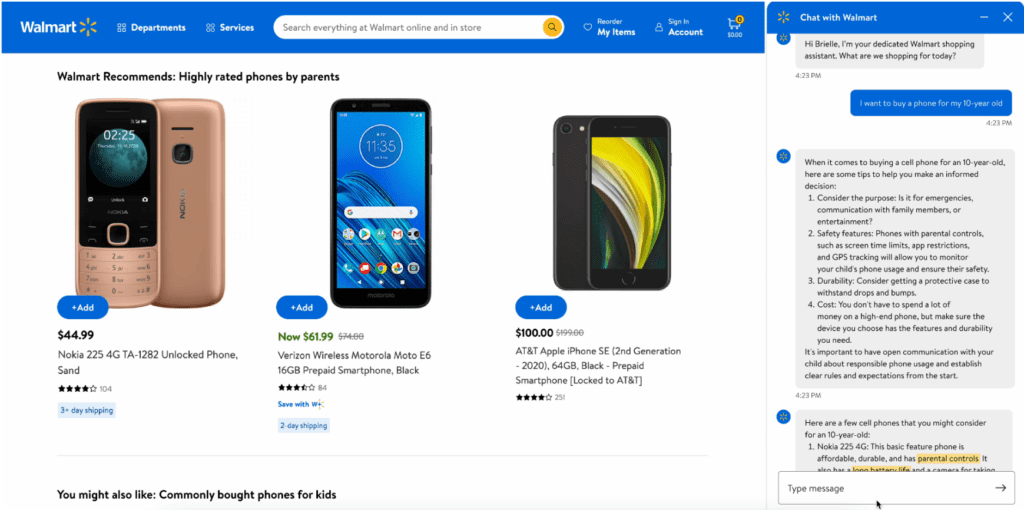TL;DR:
- Walmart explores generative AI to enhance customer shopping.
- New tools include a conversational shopping assistant, AI-powered search, and interior design features.
- Walmart maintains flexibility by using various external AI models.
- The shopping assistant offers personalized recommendations and answers specific questions.
- AI-driven search saves time by understanding context and providing comprehensive product collections.
- Walmart faces competition from Instacart and Meta in AI integration.
- An interior design assistant combines generative AI and AR technology.
- Customers upload room photos, receive redecoration suggestions, and set budgets.
- Walmart prioritizes generative AI technology in its ongoing efforts.
- The AI app “My Assistant,” streamlines tasks for corporate employees.
- Walmart’s foray into generative AI redefines the shopping experience.
Main AI News:
In a strategic move towards enhancing the shopping experience, Walmart is delving deep into the realm of generative AI. Following the successful deployment of a generative AI tool for its corporate employees in August, the retail giant is now extending this cutting-edge technology to its customers. During an exclusive demo with TechCrunch, a Walmart spokesperson revealed the company’s pioneering efforts in harnessing generative AI to assist shoppers at every stage of their retail journey, from exploration and discovery to the final purchase. Among the forthcoming innovations are a groundbreaking shopping assistant, a generative AI-powered search engine, and an interior design feature, all designed to revolutionize the way we shop.
Walmart remains discreet about the specifics of the AI models driving these features, emphasizing its commitment to flexibility. Unlike some competitors, Walmart refuses to be confined to a single AI provider, opting instead to explore various external models, keeping its options open for future adaptations.
The imminent launch of Walmart’s new shopping assistant promises customers a more interactive and conversational experience. This advanced AI tool can respond to specific queries, offer personalized product recommendations, and furnish comprehensive details about various items. For instance, it can help shoppers select the perfect Halloween costume for a horror-themed party or guide parents in choosing the right cell phone for their children.
Moreover, users will soon find themselves in the comfort of a search bar that understands context. Powered by generative AI, Walmart’s search tool will intelligently process questions and provide a curated selection of relevant products in response. If, for instance, a customer seeks ideas for a unicorn-themed birthday, the AI will present an array of products, such as balloons, paper napkins, and streamers, all in one go. This innovative feature aims to save customers valuable time, sparing them the hassle of typing multiple separate queries.
Walmart’s innovation is not without competition. Instacart, for instance, recently introduced a ChatGPT-powered search tool capable of generating suggestions like high-protein foods or Thanksgiving dinner ideas. In a parallel development, Meta unveiled a Bing-backed AI Assistant and an AI personality chatbot, among other tools, indicating a broader industry trend toward AI integration.
But Walmart’s ambitions extend beyond shopping assistance. The retail giant is also crafting an interior design assistant to help customers beautify their living spaces. This feature leverages not only generative AI but also augmented reality (AR) technology. Users are required to upload a photo of their room, after which the AI captures images of all the items within. Customers can then seek advice from the chat assistant on how to redecorate, with the AI placing suggested items within the room. Users are free to voice their preferences and budget constraints, allowing the AI to suggest affordable items accordingly.
Walmart’s unwavering commitment to generative AI tools mirrors a growing industry trend as more companies race to integrate this transformative technology into their products and services. As the Walmart spokesperson succinctly puts it, “Generative AI technology is a priority for the company.”
These groundbreaking tools are launched on the heels of Walmart’s introduction of its AI app, “My Assistant,” which has streamlined tasks for 50,000 corporate employees in the U.S. The app has received enthusiastic feedback, with some employees even using it to craft clever out-of-office messages. Walmart’s foray into generative AI underscores its determination to redefine the shopping experience, setting the stage for a future where AI-driven innovation is at the forefront of retail.

Source: Walmart
Conclusion:
Walmart’s strategic adoption of generative AI tools signals a significant shift in the retail market. By offering personalized shopping experiences, streamlining product discovery, and aiding in interior design, Walmart aims to stay at the forefront of AI-driven innovation. The company’s flexibility in exploring diverse AI models reflects a broader industry trend, as competitors like Instacart and Meta also invest in AI technologies. This indicates that AI integration is becoming increasingly vital for companies seeking to redefine the shopping experience and remain competitive in the market.

